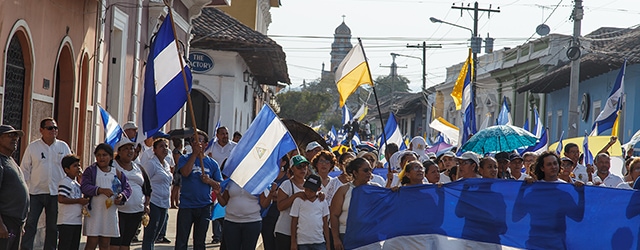Political strife is hammering Nicaragua’s economy. Can the nation’s stakeholders return to common ground?

|
NICARAGUA: VITAL STATISTICS |
|---|
|
Location: Central America |
|
Neighbors: Honduras, Costa Rica |
|
Capital city: Managua |
|
Population (2018): 6,308,309 |
|
Official language: Spanish |
|
GDP per capita (2017): US$2,221.80 |
|
GDP growth (2017): 4.9% (2018 expected to be substantially lower) |
|
Inflation (2017): 3.9% |
|
Currency: Córdoba |
|
Investment promotion agency: PRONicaragua |
|
Investment incentives available? Especially for exportoriented sectors, tourism, mining and forestry; tax incentives vary with sector |
|
Ease of Doing Business rank (2019): 132 |
|
Corruption Perceptions Index rank (2017): 151 |
|
Political risks: Danger in discussing local politics; drugs destined for the US |
|
Security risks: Rising street crime, especially in areas with low police presence; road travel after dark discouraged; heavily armed groups patrol around the clock. |
|
PROS |
|---|
|
Large freshwater body |
|
Comprehensive list of free trade agreements |
|
Improved telecommunications |
|
No currency restrictions and many transactions executed in US dollars |
|
CONS |
|---|
|
Nonessential travel discouraged |
|
Street assaults |
|
Possibility of remaining landmines |
|
Limited health care |
|
Sources: CentralAmericaData.com, Deloitte, Envío: Información sobre Nicaragua y Centroamérica, International Monetary Fund, pwc, Reuters, Stratfor, Today Nicaragua, Transparency International, US/UK Foreign Travel Advisories, World Bank |
|
For more information, check out Global Finance‘s Nicaragua Economic Report data page. |
When Nicaraguans work together, their economy works well. The country notched 6.5% growth in GDP in 2012 and then slowed to respectable levels just under 5% between 2013 and 2017. Government, businesses and worker groups generally collaborated on policy. That reassured international investors, who sought opportunities in sectors such as tourism, apparel and transportation. Net foreign direct investment (FDI) inflows were close to $900 million in 2016 and 2017. Along with strong remittances, a steady flow of funds from multilateral development banks and its relationship with Venezuela meant that Nicaragua did not have to borrow in global capital markets. The stable economic environment boosted Nicaragua’s growth.
“It is a very predictable country,” says Renzo Merino, assistant vice president and analyst at Moody’s Investors Service. “Despite President Ortega’s [leftist] ideology, he does work closely with international organizations like the IMF and the World Bank.”
However, since April, when a plan to raise social security taxes while cutting its benefits once again sparked public anger, that stability has been increasingly challenged. Anti-austerity protests, which have been erupting on and off since 2013, erupted again and spread, prompting a severe crackdown. Media reports have government forces repressing protests with brutal violence, even killing protesters. Estimates place the death toll between 325 and 450, and the number of injured above 2,000. At the end of September, Ortega declared political demonstrations illegal. Calls for his resignation have only grown louder.
The turmoil has undone some of the prior comity. “The consensus-building that helped the [business] environment has completely broken down,” Merino says. “Where before we were expecting economic growth to be close to 4.5%, right now we think that most likely the economy will contract this year.”
There are other repercussions. Tourism has dropped. At least one tour operator, Air Transat, cancelled all flights to Nicaragua, citing weak demand due to the crisis. A sea change has hit FDI, according to economist Néstor Avendaño, who worked for several national administrations during a 36-year career in the Nicaraguan public service. “Little investment has come from abroad since April 18,” he says. “There is no confidence from the foreign investor.”
Investors have other options. “Costa Rica has the same terrain, a much better government in terms of stability [and] the same geographic potential,” says Dr. Janet Walsh, president of business advisory Birchtree Global. “It’s all about risk.”
Funding levels continue to plague government budgeting. Loans and donations from Venezuela have been dropping for several years, and the World Bank has frozen new lending. Yet there are bright spots too. Losses from Venezuela have been partly offset by funds from the US, Mexico and Panama. The World Bank continues to fund programs underway, and the Inter-American Development Bank has not limited funding. And there is no apparent threat to the inflow of remittances



